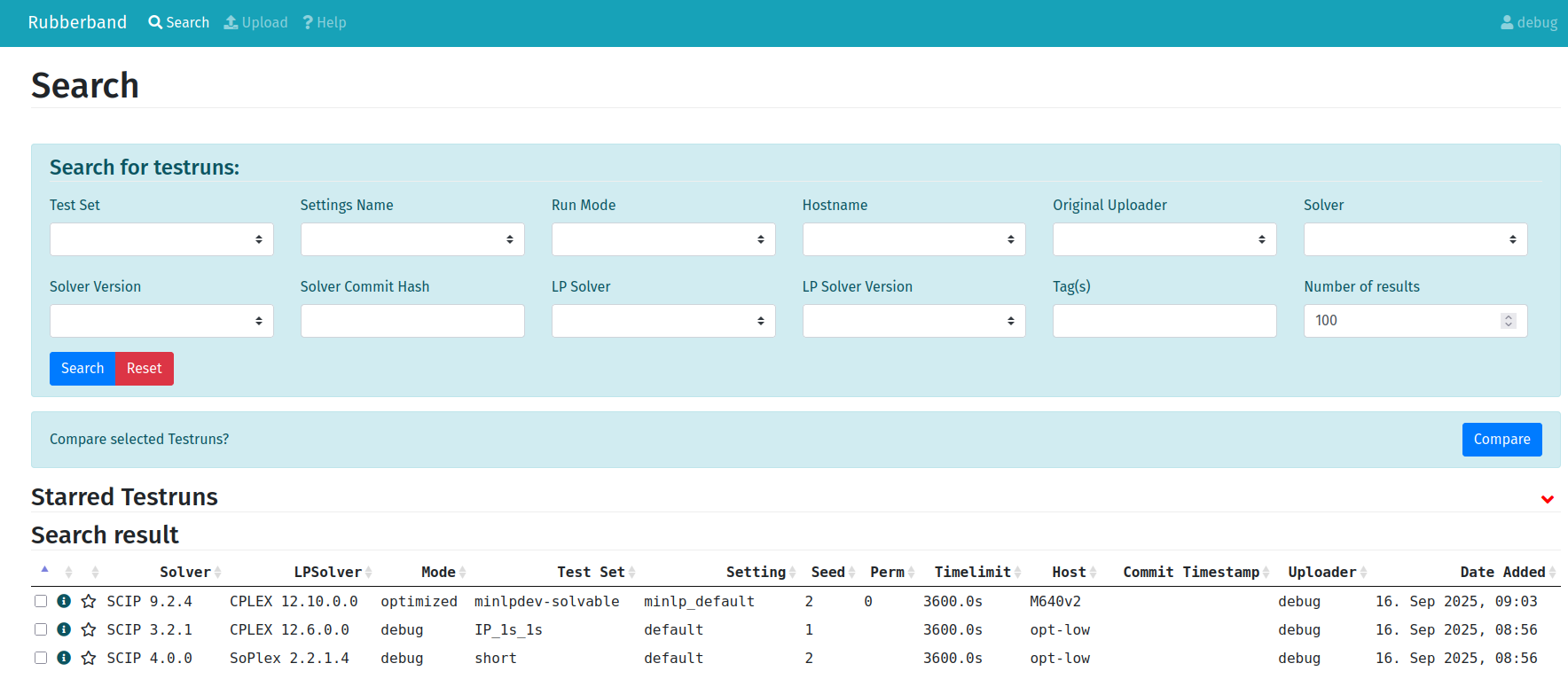A flexible web view and analysis platform for solver log files of mathematical optimization software, backed by Elasticsearch.
This is a detailed description of how to set up Rubberband.
sudo apt install git curl libffi-dev libssl-dev libsqlite3-dev libbz2-dev libncurses-dev libreadline-dev liblzma-dev zlib1g-dev tk-dev libxml2-dev libxslt1-dev
Download the .deb package and install it manually. Elasticsearch comes bundled with the version of Java that it needs to run.
wget https://artifacts.elastic.co/downloads/elasticsearch/elasticsearch-9.1.3-amd64.deb
wget https://artifacts.elastic.co/downloads/elasticsearch/elasticsearch-9.1.3-amd64.deb.sha512
shasum -a 512 -c elasticsearch-9.1.3-amd64.deb.sha512
sudo dpkg -i elasticsearch-9.1.3-amd64.deb
This version of Elasticsearch comes with various security configurations enabled. For local development, you can turn all of these off. To do that, open up /etc/elasticsearch/elasticsearch.yml and change the following configuration options to false:
xpack.security.enabledxpack.security.enrollment.enabledxpack.security.http.ssl.enabledxpack.security.transport.ssl.enabled
Rubberband is built on tornado and IPET, an interactive performance evaluation tool that comes with a parsing library for benchmark files. To get Rubberband running locally, make sure you first have Elasticsearch installed and running.
sudo service elasticsearch start
Now install pyenv.
curl -fsSL https://pyenv.run | bash
Then clone this repository, install the correct python version and set up a virtual environment.
pyenv install
pyenv virtualenv venv
pyenv activate venv
pip install -r requirements.txt
pip install -r requirements-dev.txt
The first install command will clone and install IPET from github, you don't need to do this manually.
For a deployed version of Rubberband copy the configuration file in config/app.cfg into /etc/rubberband/, and edit the required variables. Rubberband has some sane defaults already configured, so this step isn't strictly required. However, if you want to connect Rubberband to a Gitlab instance, or to an SMTP server to send email, you will need to edit app.cfg.
NOTE: If you install Rubberband as a developer version, you don't need to do this.
To populate the database or run unit tests, first install Rubberband inside the virtualenv.
python -m pip install .
Now take a look at the control script in bin/rubberband-ctl. Running the control script with no options will show the help. For first-time, create the indices, and populate the indices with data. This can be accomplished with the following two commands.
bin/rubberband-ctl create-indices
bin/rubberband-ctl populate-indices
The second command will need a few minutes to finish. If the commands complete sucessfully, stdout should look something like this:
...
16-09-2025 12:19:29 - 488 INFO elastic_transport.transport POST http://127.0.0.1:9200/testset/_doc [status:201 duration:0.030s]
16-09-2025 12:19:29 - 500 INFO elastic_transport.transport POST http://127.0.0.1:9200/settings/_doc [status:201 duration:0.005s]
16-09-2025 12:19:29 - 512 INFO elastic_transport.transport POST http://127.0.0.1:9200/settings/_doc [status:201 duration:0.007s]
16-09-2025 12:19:29 - 521 INFO elastic_transport.transport POST http://127.0.0.1:9200/testset/_update/4o1SU5kBKuV0IQ9c9FAz?if_primary_term=1&if_seq_no=15&refresh=false [status:200 duration:0.009s]
16-09-2025 12:19:29 - 529 INFO elastic_transport.transport POST http://127.0.0.1:9200/result/_doc [status:201 duration:0.004s]
16-09-2025 12:19:29 - 537 INFO elastic_transport.transport POST http://127.0.0.1:9200/result/_doc [status:201 duration:0.004s]
16-09-2025 12:19:29 - 548 INFO elastic_transport.transport POST http://127.0.0.1:9200/result/_doc [status:201 duration:0.008s]
16-09-2025 12:19:29 - 556 INFO elastic_transport.transport POST http://127.0.0.1:9200/result/_doc [status:201 duration:0.004s]
16-09-2025 12:19:29 - 563 INFO elastic_transport.transport POST http://127.0.0.1:9200/result/_doc [status:201 duration:0.004s]
16-09-2025 12:19:29 - 571 INFO elastic_transport.transport POST http://127.0.0.1:9200/result/_doc [status:201 duration:0.004s]
16-09-2025 12:19:29 - 580 INFO elastic_transport.transport POST http://127.0.0.1:9200/result/_doc [status:201 duration:0.006s]
16-09-2025 12:19:29 - 584 INFO elastic_transport.transport POST http://127.0.0.1:9200/testset/_update/4o1SU5kBKuV0IQ9c9FAz?if_primary_term=1&if_seq_no=16&refresh=false [status:200 duration:0.003s]
16-09-2025 12:19:29 - 584 INFO rubberband.utils.importer Data for file /home/user/workspace/r/tests/data/check.IP_1s_1m.scip-3.2.1.linux.x86_64.gnu.dbg.cpx.opt-low.default.out was successfully imported and archived
16-09-2025 12:19:29 - 587 INFO rubberband.utils.importer Backing up /home/user/workspace/r/tests/data/check.IP_1s_1m.scip-3.2.1.linux.x86_64.gnu.dbg.cpx.opt-low.default.out in Elasticsearch
16-09-2025 12:19:29 - 594 INFO elastic_transport.transport POST http://127.0.0.1:9200/file/_doc [status:201 duration:0.006s]
16-09-2025 12:19:29 - 595 INFO rubberband.utils.importer Backing up /home/user/workspace/r/tests/data/check.IP_1s_1m.scip-3.2.1.linux.x86_64.gnu.dbg.cpx.opt-low.default.set in Elasticsearch
16-09-2025 12:19:29 - 602 INFO elastic_transport.transport POST http://127.0.0.1:9200/file/_doc [status:201 duration:0.005s]
16-09-2025 12:19:29 - 602 INFO rubberband.utils.importer Backing up /home/user/workspace/r/tests/data/check.IP_1s_1m.scip-3.2.1.linux.x86_64.gnu.dbg.cpx.opt-low.default.meta in Elasticsearch
16-09-2025 12:19:29 - 608 INFO elastic_transport.transport POST http://127.0.0.1:9200/file/_doc [status:201 duration:0.003s]
16-09-2025 12:19:29 - 609 INFO rubberband.utils.importer Backing up /home/user/workspace/r/tests/data/check.IP_1s_1m.scip-3.2.1.linux.x86_64.gnu.dbg.cpx.opt-low.default.err in Elasticsearch
16-09-2025 12:19:29 - 614 INFO elastic_transport.transport POST http://127.0.0.1:9200/file/_doc [status:201 duration:0.005s]
16-09-2025 12:19:29 - 615 INFO rubberband.utils.importer /home/user/workspace/r/tests/data/check.IP_1s_1m.scip-3.2.1.linux.x86_64.gnu.dbg.cpx.opt-low.default.out file bundle backed up in Elasticsearch.
16-09-2025 12:19:29 - 615 INFO rubberband.utils.importer Finished!
Cross your fingers and run the following command from your virtual environment.
python server.py
If everything went well, you should be able to open http://127.0.0.1:8888/ in your browser and see something that looks like this.
Continuous integration is configured with Github Actions, and is run on every pull request. For more information about the CI workflow, please see here.
To build the documentation run the following commands from inside the virtualenvironment:
cd doc
make doc
Now you can view the documentation by opening doc/build/html/index.html in your favorite webbrowser.
First, install Rubberband locally:
python -m pip install .
Then, run the test suite.
pytest
Tests will fail if Elasticsearch is not running, or if the indices are empty or if you didn't configure authentication correctly.
Rubberband currently requires a connection to an Elasticsearch 9.x instance and (optionally) a Gitlab instance to run. To configure a Gitlab connection, edit the configuration variables in /etc/rubberband/app.cfg beginning with gitlab_. The Gitlab connection is used to look up information from the code base that your test set log is linked to. Examples of this type of information are git commit date and last committer. The visualize tab is disabled if no Gitlab connection information is provided.
There is no authentication built into Rubberband, though rubberband will authorize requests to the frontend using the X-Forwarded-Email header. Request made to the API require this header, as well as an X-Api-Token header. This is to say that authentication and setting the appropriate headers is the responsibility of the user/deployer. oauth2_proxy is a convenient proxy that, when properly hooked up to an OAuth provider, will set this header for you.
Rubberband is meant to be deployed behind a production webserver, such as a nginx or apache. See config/rubberband-oauth for a sample nginx configuration. This example shows an HTTPS deployment configured with Let's Encrypt.
Supervisor is a process monitor and manager, and great way to make sure Rubberband keeps running reliably in production.
See CONTRIBUTING.md.
